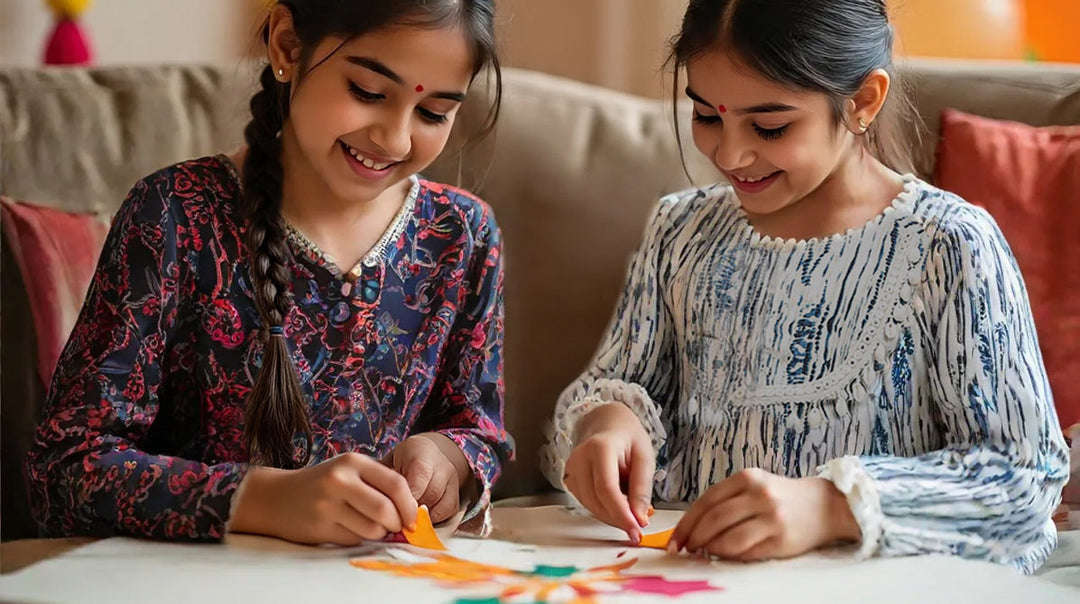Bedtime Stories With Morals for Kids

There is nothing like narrating a story to children. Bedtime stories for kids are not only important in helping build a child’s imagination but they serve as enlightening. A good story holds a child’s attention, informs their moral compass and makes them more compassionate. Ideally, a story is simple and easy to follow, featuring interesting characters, a good plot and a nice moral lesson that arises from the consequences of the characters’ actions. This moral serves as a takeaway that lasts long after the story has ended.
Why Moral Lessons in Bedtime Stories Help Kids Grow
Short bedtime stories for kids should not only serve as methods of entertainment but also aim to enrich a child’s personality, helping them in the long term. A good story not only serves as a good tale, but also exposes the child to universal truths about society and how we should treat other people. Life’s lessons, when taught in this way, tend to stick with children as they are able to relate and grasp the fundamental importance of the lesson through the story’s progression.
How to Tell a Bedtime Story That Kids Will Love
Telling bedtime stories for kids is one of the most magical ways to end the day. Not only does it help your child wind down, but it also sparks their imagination, strengthens your bond, and fosters a love for books. But how do you tell bedtime stories for kids that they’ll truly enjoy? Let’s dive into a few tips.
1. Choose the Right Story
Picking the right bedtime stories for kids in English is crucial. Depending on your child’s age and interests, the story should captivate them from the start. Whether it’s a fun animal adventure or a calming fairy tale, choose a story that aligns with their preferences. If you’re unsure, ask your child what they’d like to hear. Sometimes their suggestions can lead to the most delightful stories.
2. Make It Fun and Interactive
Kids love bedtime stories that they can engage with. Use silly voices, sound effects, and exaggerated gestures to bring the characters to life. You could also ask questions like, “What do you think will happen next?” or “How would you feel if you were the main character?” This helps keep them engaged and makes bedtime stories even more exciting.
3. Create the Right Setting
Setting the scene is just as important as the story itself. Dim the lights, cuddle up in a cozy spot, and make sure both you and your child are comfortable. This creates the perfect environment for winding down and enjoying short bedtime stories for kids. A calm and peaceful atmosphere makes it easier for children to relax and focus on the story.
4. Be Expressive
Children are drawn to expressive storytellers. Slow down during suspenseful moments and speed up during exciting parts. Use different tones and voices to convey emotions, whether it’s a soft voice for a tender scene or a dramatic one for an adventurous moment. This will make the story feel alive and keep your child hooked.
5. Keep It Short and Sweet
Short bedtime stories for kids are often the best choice, as they help maintain your child’s attention without overstimulating them before bed. A story lasting 10-15 minutes is ideal for winding down, so keep the tale short and sweet to ensure your child is relaxed and ready to sleep.
By following these tips, you’ll create an engaging and memorable bedtime story experience for your child that they will look forward to every night!
When to Start Reading Bedtime Stories to Your Baby
It’s never too early to start reading bedtime stories for babies! In fact, starting this habit early can help boost your baby’s cognitive development and foster a love for reading. But when is the right time to start reading bedtime stories to your little one?
Start Right Away !
Even newborns benefit from hearing bedtime stories for babies. While they won’t understand the words, they’ll respond to the soothing sound of your voice. Reading simple nursery rhymes or lullabies helps your baby become familiar with language patterns and gives them a sense of security, setting the stage for a bedtime routine they will come to love.
Around 6 Months—Introduce Picture Books
By the time your baby is around six months old, they’ll begin to pay attention to visual stimuli. This is the perfect time to introduce board books with bold images and simple text. Bedtime stories for babies at this stage should be interactive—point at pictures, name the objects, and make sounds that correspond to what they see. While they can’t read, they’ll start associating books with enjoyment.
Around 12 Months—Simple Narratives
By 12 months, babies will begin to understand more about the world around them. Introduce simple bedtime stories for kids in English, focusing on short, easy-to-follow plots with large pictures. You can still make these stories interactive by using expressive tones and incorporating sounds of animals or objects. Your baby may even start to recognize familiar words or phrases from their favorite books.
2+ Years—Engagement with Stories
When your child reaches two years old, they’ll likely start to show more interest in the story itself. They might enjoy short bedtime stories for kids that have a repetitive pattern or rhyme. Encourage their engagement by asking them about the pictures or what happens next. This is also a great time to introduce bedtime stories for kids in English that encourage them to participate and answer questions.
Why Moral Stories are Good for Kids
Stories should not only serve as methods of entertainment but also aim to enrich a child’s personality, helping them in the long term. A good story not only serves as a good tale, but also exposes the child to universal truths about society and how we should treat other people. Life’s lessons, when taught in this way, tend to stick with children as they are able to relate and grasp the fundamental importance of the lesson through the story’s progression.
Best Bedtime Stories for a Peaceful Good Night Sleep
When narrating a story to your child at bedtime, you may find yourself running out of ideas. This list of bedtime stories for kids in English, which is timeless, is meant to appeal to you for that very reason. These are also perfect bedtime stories for babies as they’re short, soothing, and meaningful.
The Golden Egg Laying Goose

There was once a farmer who owned a special goose. This goose would lay a golden egg daily. The farmer would sell the egg at the market, earning money due to its unique gold color. However, he wanted more than one egg a day and felt frustrated that the goose was only laying one egg a day.
One day, after the goose laid its egg, he killed it, cutting it open and hoping for more golden eggs inside. Instead, all he found was blood, veins and organs. He realized he had killed an innocent creature and damaged his income due to his greed. Despite all he lamented, the damage was irreversible.
Moral: Don’t be greedy.
The Miser and the Gold

There was once a miser who did not like spending his money. He kept all his gold coins and the rest of his money hidden beneath some rocks in his garden. He would count them and then sleep. One day, a thief discovered his secret. After the miser slept, the thief stole all his gold coins and money from under the rocks.
The miser, shocked and sad, began crying out loud. His neighbors frantically asked him what had happened. When he explained, they were puzzled by his decision to keep the coins under the rocks and asked why he hadn’t kept the money in his house where it would be safer. He said that he did so to prevent himself from spending it. Hearing this, the neighbors mocked him and said that it did not matter if the money was stolen as he would have never spent it anyway. He might as well just count the rocks before sleeping instead. The miser realized his mistake.
Moral: Saving is good, but you should use your possessions instead of being miserly.
The Frustrated Girl

A girl, tired of life, asked her father for advice. He asked her to bring him three things: an egg, two tea leaves and a potato. Puzzled, she still listened to him and did as asked. He put each of them in a vessel.
Then he asked the girl to strain the leaves and peel the egg as well as the potato. Once she complied, he explained they had all changed. The egg, which had been hard, was now soft. The potato, once soft, was now hard. The tea leaves had changed the water only.
He explained we can all choose to respond to life and its difficulties in different ways. We should be resilient instead of being frustrated,
Moral: We can’t control how difficult life is, but we can control how we respond to it and face it.
The Clever Cat and the Wary Rats

Once, there was a skilled cat who would hunt rats successfully, preying and pouncing on them. The rats, who were terrified, stopped coming out of their den in fear of the cat. So the cat pretended to be dead- it climbed on a shelf and hung itself from there, head downwards, paws on a rope.
The rats saw the presumably dead cat. They came out cautiously to check if it was true. As all seemed fine, they began celebrating. Just then, the cat stopped pretending. It grabbed three rats to hunt and eat successfully. The others, petrified, rushed back into their dens.
The next time, the cat was hungry again. It covered itself in flour. The rats saw a bundle of flour and rushed to eat it. Just then, a wise old rat warned them: it could be the cat rolled and covered in the floor to lure them again. So they heeded the wise rat’s advice and were saved.
Moral: The power of wisdom is unmatchable. The wise do not let themselves be fooled twice. We should always listen to the wise.
The Boy Who Cried Wolf

Once upon a time, there was a young shepherd boy who used to herd sheep around. He was feeling bored one day, so he naughtily decided to pretend there was a wolf running and capturing the sheep. His false alarm worked- the villagers came on the scene to help the poor sheep. When they realized the boy was lying, they were furious. He repeated the lie a few more times, causing outrage and distrust.
One day, the sheep were actually attacked by a wolf. When the boy called for help, nobody believed him as they thought he was joking again. Due to this, the sheep were killed. The boy realized that his lying had caused distrust and he felt sorry as well as ashamed.
Moral: Honesty is the best policy, as lying breaks trust.
The Thirsty Crow

A thirsty crow flew all around a town looking for water. He could not find it and felt miserable. On the verge of giving up, he spotted a pot of water. He rushed down to drink from it, but hopelessly realized the water level was so low his beak would not be able to reach it.
He tried to push the pot down but it was too heavy for him. Just then, he spotted a pebble. He put the pebble inside the pot. The water level rose. So he added more pebbles until the level was high enough for his beak to reach it. He drank the water. His thirst was quenched.
Moral: Never give up and keep trying. Thinking of innovative solutions is great.
The Midas Touch

In Ancient Greece, a king called Midas was wealthy. He had a loving daughter, who was his precious family. Despite all this, he ached for more. He did a good deed for a Satyr once. This caused Dionysus, the God of celebration, who the saved Satyr had been loyal to, to grant him a wish. So, Midas asked that anything he touched turn to gold instantly.
Dionysus granted him the wish but attempted to warn him against it. Midas did not listen. Later, he touched an apple which turned to gold. He was overjoyed. His Midas touch fascinated the courtiers and others around him. However, in his excitement, he hugged his daughter.
The daughter turned to gold. Midas was shocked and sad. He tried to undo it but he couldn’t. He realized his greed had become his downfall.
Moral: Don’t be greedy. Be content with what you have.
The False Friend and The Bear

Once upon a time, two friends were walking through a forest path, which was dangerous. They promised to stay together to protect each other. Suddenly, a bear approached them. Terrified, one friend abandoned the other, climbing up a tree to escape and forgetting the promise.
The other friend pretended to be dead to escape the bear. The bear approached, smelled his ear and then walked away. The other friend came down the tree and asked what had happened. The friend who had been abandoned simply said that the bear told him to beware of false friends who abandoned promises.
Moral: A true friend sticks with you despite the situation.
The Crocodile and The Monkey

A clever monkey resided high up in a tree. He ate berries and enjoyed life. A tired, hungry crocodile swam near the tree, asking for some berries. The kind monkey gave him some berries. Happy, the crocodile asked if he could come again. The monkey agreed. So this became a ritual, where the crocodile would come, hungry, and the monkey would share fruit with him. They became good friends.
The crocodile’s wife lived on the other side of the river under the tree. So the monkey sent fruits for her too. Instead of being grateful, the wife was jealous. She reasoned that if the monkey survived on a diet of fruits, his flesh would be tasty. She asked the crocodile to call the monkey for dinner, but he suspected his wife and refused. So, she pretended to be ill and told the crocodile that the only available cure was a monkey’s heart.
Wanting to save her, the crocodile told the monkey his wife had prepared dinner. The monkey, fine at first, sensed danger halfway across the river. He asked the crocodile, who told him truthfully, Scared, the monkey thought quickly, saying he had left his heart in the tree. The crocodile swam him back to collect his heart. The monkey climbed up the tree and told the crocodile to tell his wife that she had married an idiot.
Moral: It’s important to be clever. Be clever and use your mind to think on the spot to escape danger.
The Bundle of Sticks

An old man had three sons who constantly fought. When he got ill and felt he was near his deathbed, he told them to stop fighting. They paid him no heed. He was forced to teach them a lesson.
He gave them a bundle of sticks and asked them to break it all together. They tried but could not succeed. They began fighting again. He shushed them and then gave them individual sticks from the bundle, showing how each could be easily broken now. This represented the importance of unity.
Moral: We are stronger when united than when divided.
The Fox and the Grapes

A hungry fox wandered through the outdoors. He came across a vineyard where there were grapes hanging from a high vine. Ecstatic, he tried to reach them. He tried jumping, but that did not work. He tried again and again but he failed.
Eventually, he reasoned that the grapes were probably sour anyway. Not wanting to accept his failure, he lied to himself that the grapes were bad anyway and walked away, still hungry.
Moral: Do not insult what you cannot have.
More Than Just Stories: Nurturing Young Minds, One Bedtime Tale at a Time
Understanding morals is crucial to a child’s development. These short bedtime stories for kids provide essential lessons that shape character and guide behavior. By introducing these bedtime stories early, children develop a strong sense of right and wrong, empathy, and confidence. Just as these tales offer ethical guidance, comfortable clothing allows them to explore the world with ease.
At Spunkies, we’re dedicated to supporting both moral growth and self-expression. Our vibrant, high-quality prints are designed to inspire and delight. We use sustainable, organic materials, ensuring that our kids' clothing is both stylish and eco-friendly. From knitting the fabric to dyeing it in rich colors and adding unique stitched details, every step is carefully managed in-house. This commitment ensures that your child receives the best in both comfort and quality.
Shop at Spunkies to provide your child with clothing for their entire wardrobe—and pair it with the joy of timeless bedtime stories for babies and kids that nourish their heart and soul.





